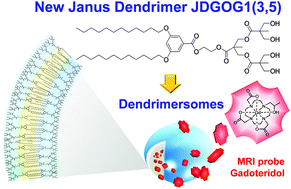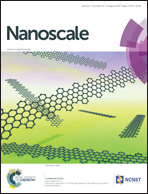Novel stable dendrimersome formulation for safe bioimaging applications†
Abstract
Dendrimersomes are nanosized vesicles constituted by amphiphilic Janus dendrimers (JDs), which have been recently proposed as innovative nanocarriers for biomedical applications. Recently, we have demonstrated that dendrimersomes self-assembled from (3,5)12G1-PE-BMPA-G2-(OH)8 dendrimers can be successfully loaded with hydrophilic and amphiphilic imaging contrast agents. Here, we present two newly synthesized low generation isomeric JDs: JDG0G1(3,5) and JDG0G1(3,4). Though less branched than the above-cited dendrimers, they retain the ability to form self-assembled, almost monodisperse vesicular nanoparticles. This contribution reports on the characterization of such nanovesicles loaded with the clinically approved MRI probe Gadoteridol and the comparison with the related nanoparticles assembled from more branched dendrimers. Special emphasis was given to the in vitro stability test of the systems in biologically relevant media, complemented by preliminary in vivo data about blood circulation lifetime collected from healthy mice. The results point to very promising safety and stability profiles of the nanovesicles, in particular for those made of JDG0G1(3,5), whose spontaneous self-organization in water gives rise to a homogeneous suspension. Importantly, the blood lifetimes of these systems are comparable to those of standard liposomes. By virtue of the reported results, the herein presented nanovesicles augur well for future use in a variety of biomedical applications.


 Please wait while we load your content...
Please wait while we load your content...